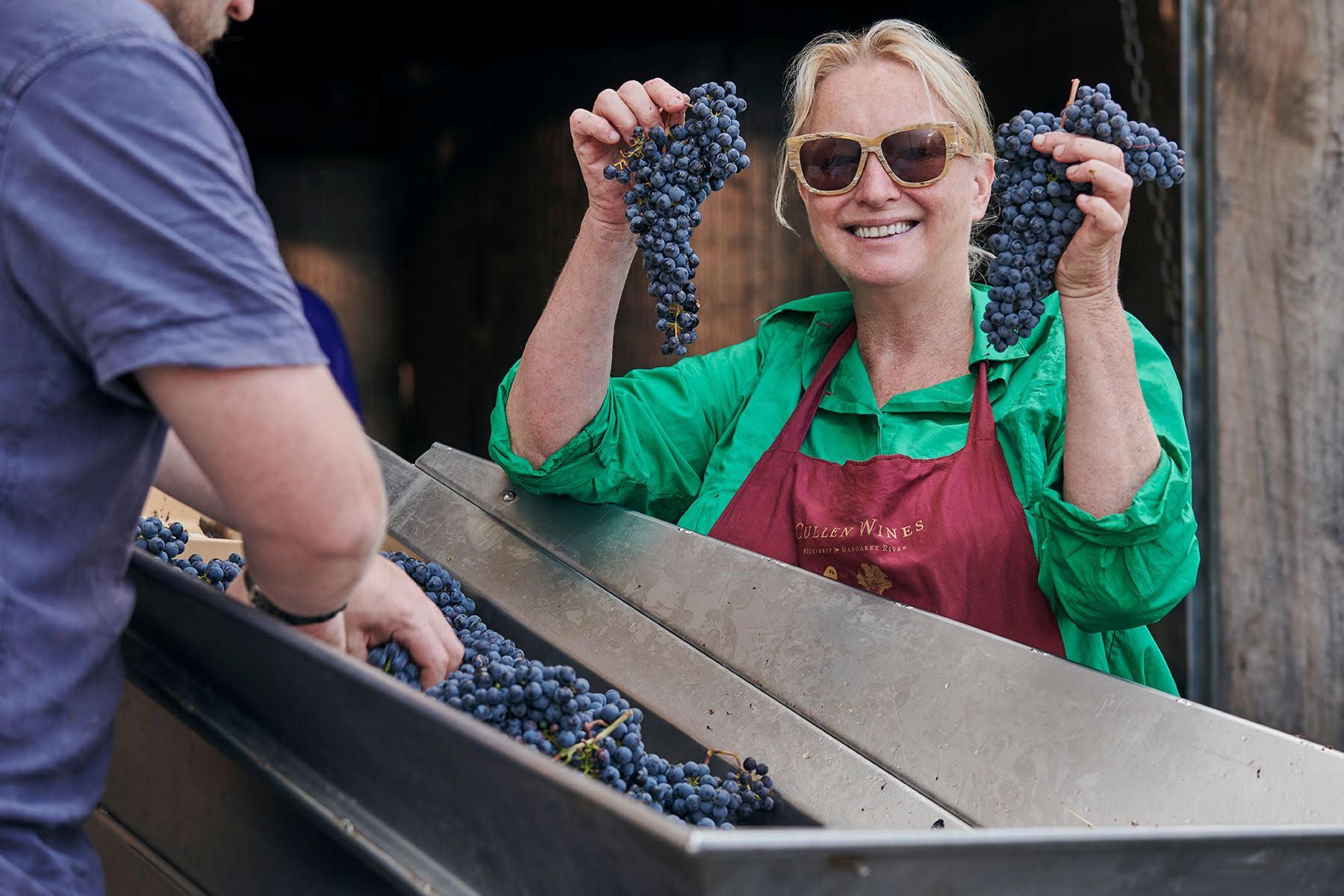“I love the isolation and how we are influenced by the rhythm and cycles of its ocean. You’ll often see other producers out in the surf or fishing before work.” That’s how winemaker Glenn Goodall sums up life both living and working in the Margaret River.
Growing up in the region, Vanya Cullen and Ian Batt internalised a deep connection to the landscape. Cullen fondly recalls the long days working on her family’s farm, followed by afternoons spent with sand between her toes, searching for seashells until the dark purple hue of the sky ushered her home. Batt reminisces about surfing in pristine conditions, pulling abalone the size of footballs off rocks and bringing home an esky full of fish.
“There was always a wave to catch and a mate’s wetsuit to steal when you forgot yours,” he says.
Glenn Goodall, who grew up in New Zealand, settled in Margaret River after meeting his wife and fellow winemaker Eloise (Ely) Jarvis. He recalls being captivated by the untamed maritime environment that created the perfect growing conditions for grapes, and also supported the lifestyle of the community.
“As a country kid, I love the isolation and how we are influenced by the rhythm and cycles of its ocean. You’ll often see other producers out in the surf or fishing before work,” he says.
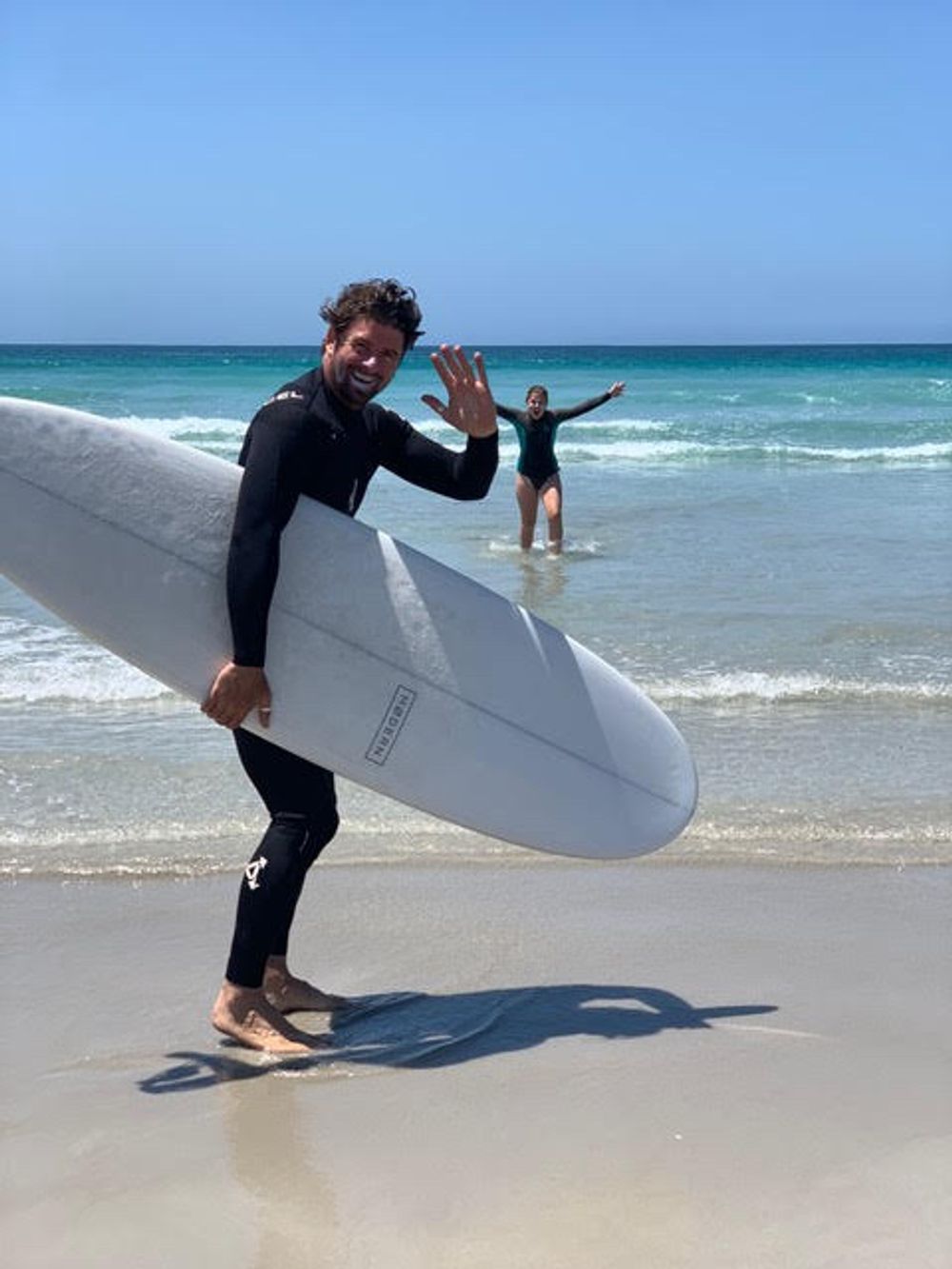
Surfing and being close to the sea and the place where they live is very much a key part of living in Margaret River says winemaker Ian Batt
With a shared view to make the best wines from the land with minimal impact, Cullen, Goodall and Batt are each a leader in their respective approach to sustainability.
Cullen embraces the principles of biodynamics, becoming the first wine producer in the nation to be certified A Grade Biodynamic by the Biological Farmers of Australia in 2004. She takes a hands-off approach in the winery, encouraging each vintage to be an expression of the land captured at a point in time rather than crafting a ‘house style’.
Under Goodall, Xanadu was the first winery in Western Australia approved to use the Sustainable Winegrowing Australia (SWA) trustmark, integrating sustainable practices into a traditional winery. This requires at least 85% of their fruit to be from certified vineyards and their wine to be produced in a certified winery.
A couple of years ago, after a career as a globetrotting cameraman, Batt came onto the scene as the first producer in the region to use aluminium cans for Small Things Wine. Inspired by the terroir-driven wines from producers like Cullen and Xanadu, Batt applies natural winemaking principles to SWA Certified grapes to produce a modern lo-fi style of wine.
Vanya Cullen: Cullen Wines
Vanya’s love for the natural world originally saw her studying zoology, until she was swept off her feet by a glass of Grand Cru Burgundy at her university wine club. This aligned perfectly with her family’s newly established vineyards, and so in 1983 Vanya Cullen became a winemaker for Cullen Wines.
“Our goal has always been the same, to make quality wines sustainably,” she says.
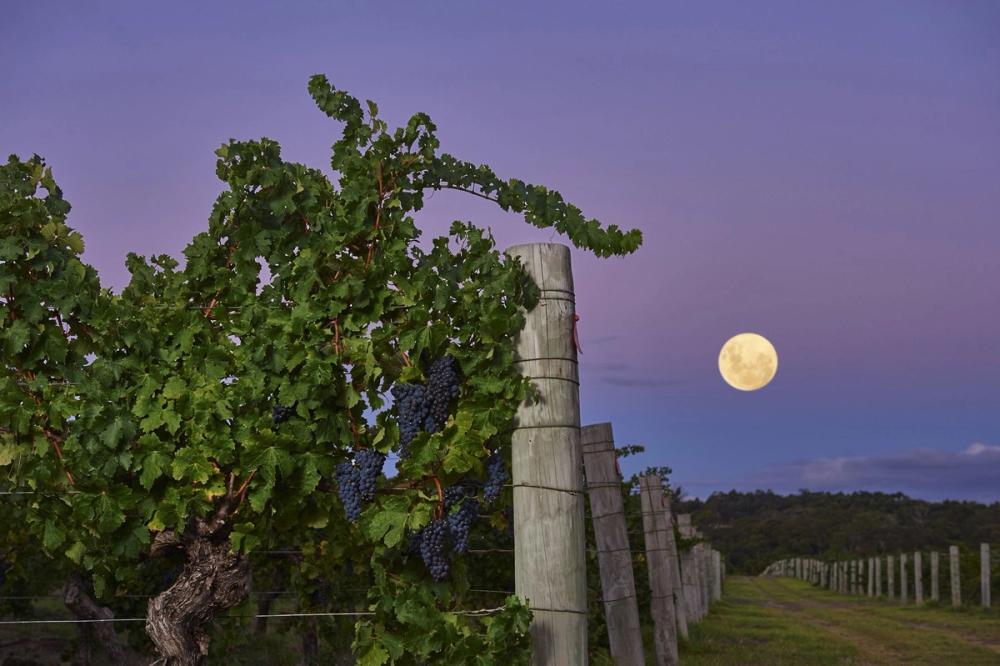
Cullen Wines has become a benchmark for and an inspiration for biodynamic winemaking in Margaret River
Working alongside her mother Diana, Cullen saw the direct correlation between wine, fruit and land quality.“As the natural land has become stronger, Cullen Wines’ story has grown stronger,” she adds.
By 1998 they had introduced organic practices to the vineyards in an effort to build healthy soils. When Cullen took over as managing director of Cullen Wines in 1999, she continued on this trajectory, eventually introducing biodynamic practices.
“My father [Kevin] taught me to look after others and the environment, and to leave the land better than you found it.”
Following the Rudolph Steiner method, Cullen implements biodynamic preparations made from natural matter to stimulate, nourish and protect her vineyard.
“The key to biodynamics is microbiological life in the soil. It’s like a gut biome, if you have healthy microflora in the land, you have a healthy vine and fruit that reflects its environment. It’s about seeing the vineyard as a whole organism,” she continues.
The practice also includes astrological cycles, said to influence life on earth. Certain planetary alignments provide Cullen with viticultural cues, such as Saturn’s alignment with the moon signalling her to apply preparation 500 (a spray made of cow dung and cow horns that invigorates the soil).
With the blessing of the Wadandi first nations people, the original custodians of the land, Cullen has incorporated their traditional practices with her biodynamic approach. This includes a six season calendar that maps the natural cycles specific to the land.
“It’s really important to acknowledge that it is their country. Nothing I am doing with biodynamics is new, they have been living with the land since ancient times.”
After 38 years, Cullen has seen Cullen Wines become certified biodynamic, carbon positive and the first Australian member of International Wineries for Climate Action. Combined with a history of exceptional terroir-driven wines and numerous accolades behind her, Cullen has proven what she has known all along; that nature is everything.
Glenn Goodall: Xanadu
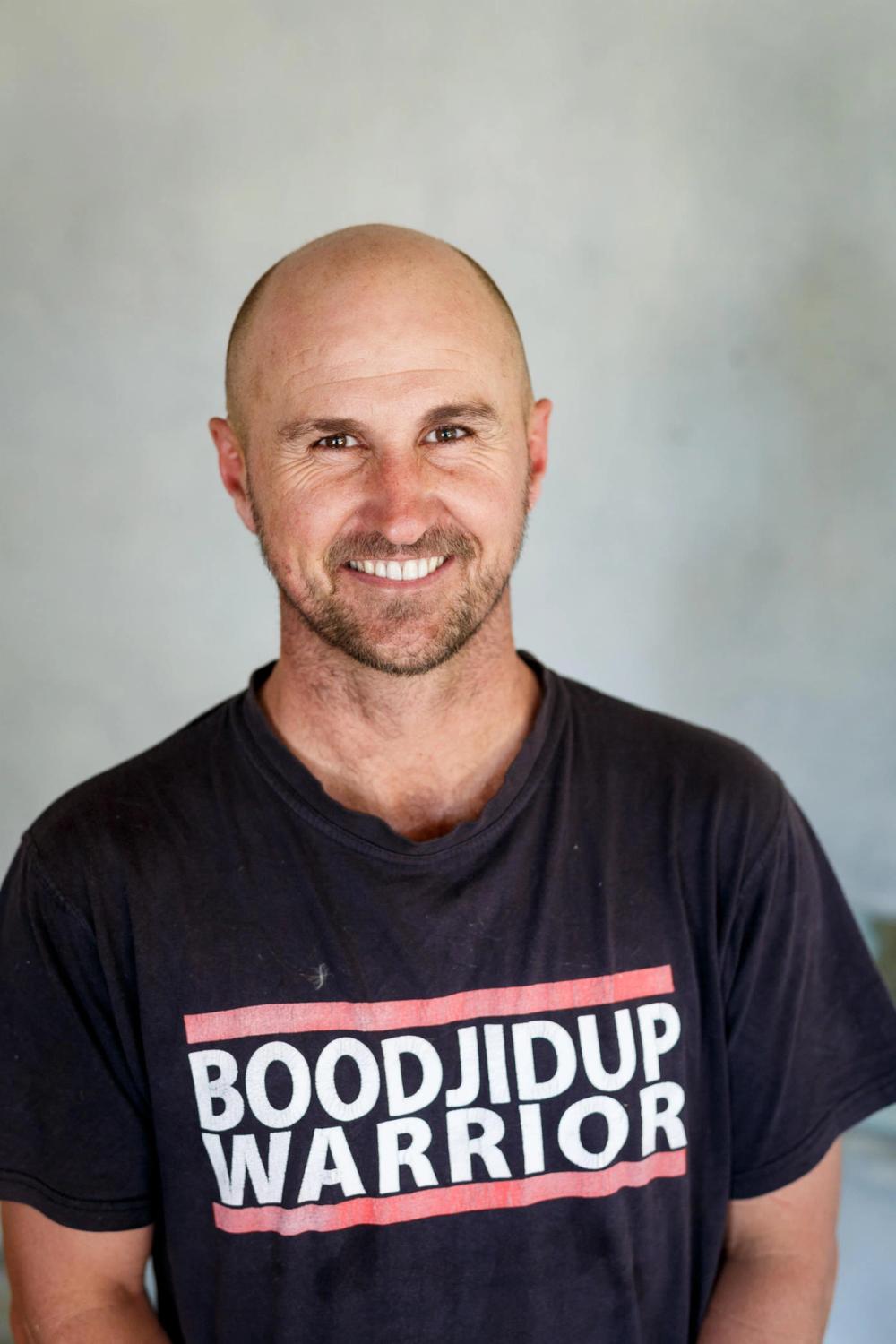
Kiwi born Glen Goodall has made his home in Margaret River
While nature was an inherent part of his life as a country kid in New Zealand, wine wasn’t something Glenn Goodall grew up around. His first experience was working in a vineyard in Port Macquarie, New South Wales, trying to earn some extra cash to fund his post-high school surfing trip. That vintage he was invited to do another in Bordeaux, having been mistaken for having more experience making wine than he did. This path eventually led him to his role as senior winemaker at Xanadu.
“I really fell into it. I liked the agricultural aspect of wine, the smell of the winery, the seasonal nature and how it provided me with an opportunity to travel and meet interesting people,” he says.
Environmental stewardship has always been important to Goodall, a sentiment shared with his wife Ely, Margaret River’s recently appointed sustainability engagement officer. In their respective roles, they work closely with Sustainable Winegrowing Australia, which focuses on creating a sustainable industry to ensure the long-term success of a region. The approach is cyclical and holistic; it involves tracking, measuring and improving environmental impact at every point.
“It’s about creating a foundation and trying to evolve with the changing environment.”
Through the cumulative effect of implementing multiple sustainable practices, the team at Xanadu have gradually lowered their environmental impact since becoming SWA certified in 2012. These include working with local land care and conservation groups, using roller-crimpers and sheep to manage vineyards, and now looking to use lighter glass bottles.
“There is a certain pride to knowing the wines you make are sustainable, and being able to communicate that to the market.”
These practices have improved the longevity of the vineyards, the quality of the land and the fruit’s character. Goodall, who also takes a hands-off approach to winemaking, credits their viticulturists and growers for Xanadu’s exceptionally expressive wine. Their Jimmy Watson trophy for the 2016 Xanadu Cabernet Sauvignon is testament to this.
Working with other winemakers in the region to create a community around sustainability, Goodall and his team at Xanadu have ‘adopted’ a section of the Cape to Cape Track. The track stretches through Leeuwin-Naturaliste National Park, where each producer maintains a designated section. Much like the inter-winery ‘End of Vintage Surfing Competition’ held in Margaret River annually, the initiative aims to bring the winemaking community together. While the team at Xanadu may lead in terms of sustainability, Goodall admits they don’t tend to do as well in surfing.
Ian Batt: Small Things Wine
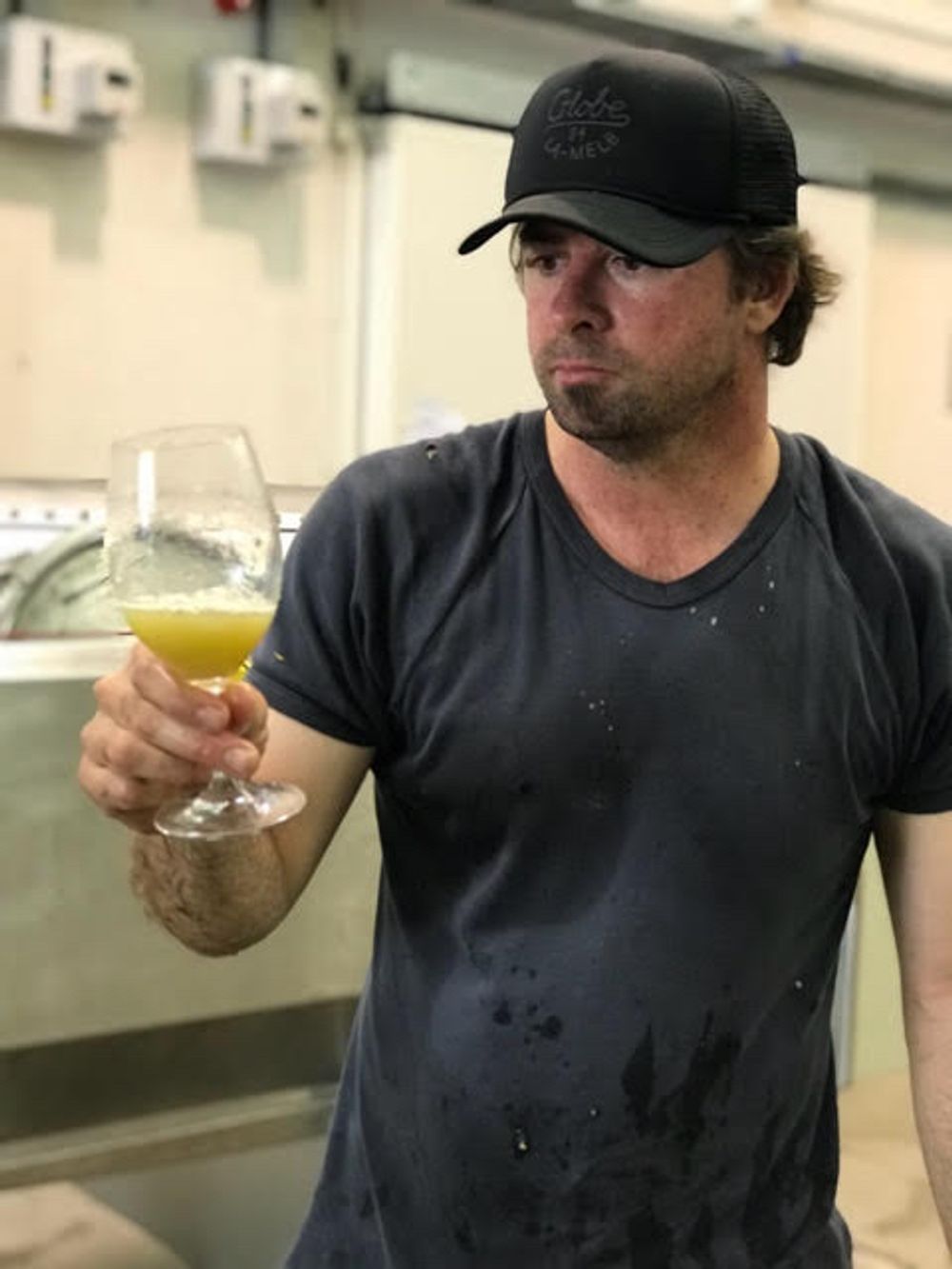
a
While Ian Batt may be a local in the surf, he is a newcomer in the Margaret River wine community. It was his experience travelling the world, filming a documentary about the revolution of Australian wine, Chateau Chunder, when he first pondered wine and cans.
“I started wondering why you never saw high quality wine in cans. The more I researched it, the more reasons I found to do it. It’s much more environmental than glass; it’s easier to recycle, and significantly reduces carbon emissions.”
Its wave logo acts as a gentle reminder to consumers of what they are protecting when they make sustainable choices. “I made sure we considered the ocean as part of our brand. It reminds me of our place; where we’ve come from and how we need to make sure to look after it,” he explains.
With cans often associated with low quality wine, Batt has had his work cut out for him. The response so far has been overwhelmingly positive, with environmentally conscious markets like Sweden drinking it by the pallet.
“Our philosophy is to under promise and over deliver. We have a responsibility to carry the mantle for alternative sustainable packaging in wine, so when someone decides to have a can of our wine it must be good.”
To achieve this, Batt works closely with Sustainable Winegrowing Australia certified growers to source his fruit.
These grapes lower the brand’s environmental impact, with the additional benefit of producing wines that are exceptionally expressive of the natural landscape. Ian even admits he doesn’t have to work very hard to get it right in the winery.
For Batt it’s all about giving back. Where each can of his wine captures a piece of the region, it also preserves its longevity.
“While it’s still immaculate, I feel we had the best of Margs when we were kids. It’s taught me that if we don’t think about the future, we will jeopardise it for the next generation.”
- Angela Oemke says she would “like to acknowledge the traditional custodians of the Margaret River region, the Wadandi, and pay my respects to their elders past and preset”.
Wine Australia: Australia Trade Tasting, January 24

- You can taste many other examples of biodynamic and sustainable wines at Wine Australia’s Australia Trade Tasting in London on January 24 featuring more than 700 wines from 200 producers including 50 who are looking for distribution in the UK. Find out more and how to register here. For more information, please email uk@wineaustralia.com.
